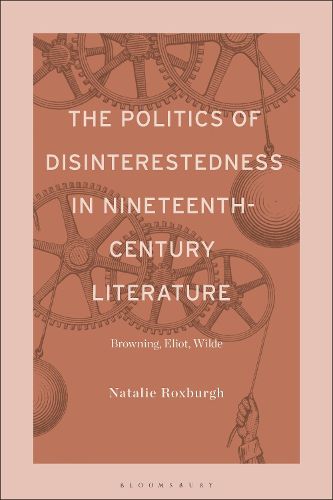Readings Newsletter
Become a Readings Member to make your shopping experience even easier.
Sign in or sign up for free!
You’re not far away from qualifying for FREE standard shipping within Australia
You’ve qualified for FREE standard shipping within Australia
The cart is loading…






The Politics of Disinterestedness in Nineteenth-Century Literature historicizes the concept of disinterestedness by examining discourses on political economy during and before the 19th century. It argues that certain literary texts respond to the way all interests are transformed into economic interests during this period. It also shows that this has implications for aesthetics and questions of aesthetic autonomy, in which discourses on disinterestedness are tied up.
Through a New Formalist approach, Natalie Roxburgh provides fresh readings of texts by Robert Browning, George Eliot, and Oscar Wilde, whose respective oeuvres demonstrate an attention to the formal affordances of literary disinterestedness that compete with-and critically assess-other versions. Browning develops a dramatic monologue so that the reader is enticed to re-read his poems; Eliot cultivates the problematic character who must struggle with her desire within a larger play of interests in a way that evolves the realist Condition of England novel; and Wilde experiments with the blending of genres in his critical essays by rendering them as dramatic dialogues that serve as contemplative mechanisms for playing with a multiplicity of interests, which he explores in terms of influence.
Reading these canonical authors through the politics of disinterestedness sheds new light on literary value and, in particular, the formal techniques seen as important by the end of the 19th century, just as liberal democracy emerged in Britain.
$9.00 standard shipping within Australia
FREE standard shipping within Australia for orders over $100.00
Express & International shipping calculated at checkout
The Politics of Disinterestedness in Nineteenth-Century Literature historicizes the concept of disinterestedness by examining discourses on political economy during and before the 19th century. It argues that certain literary texts respond to the way all interests are transformed into economic interests during this period. It also shows that this has implications for aesthetics and questions of aesthetic autonomy, in which discourses on disinterestedness are tied up.
Through a New Formalist approach, Natalie Roxburgh provides fresh readings of texts by Robert Browning, George Eliot, and Oscar Wilde, whose respective oeuvres demonstrate an attention to the formal affordances of literary disinterestedness that compete with-and critically assess-other versions. Browning develops a dramatic monologue so that the reader is enticed to re-read his poems; Eliot cultivates the problematic character who must struggle with her desire within a larger play of interests in a way that evolves the realist Condition of England novel; and Wilde experiments with the blending of genres in his critical essays by rendering them as dramatic dialogues that serve as contemplative mechanisms for playing with a multiplicity of interests, which he explores in terms of influence.
Reading these canonical authors through the politics of disinterestedness sheds new light on literary value and, in particular, the formal techniques seen as important by the end of the 19th century, just as liberal democracy emerged in Britain.